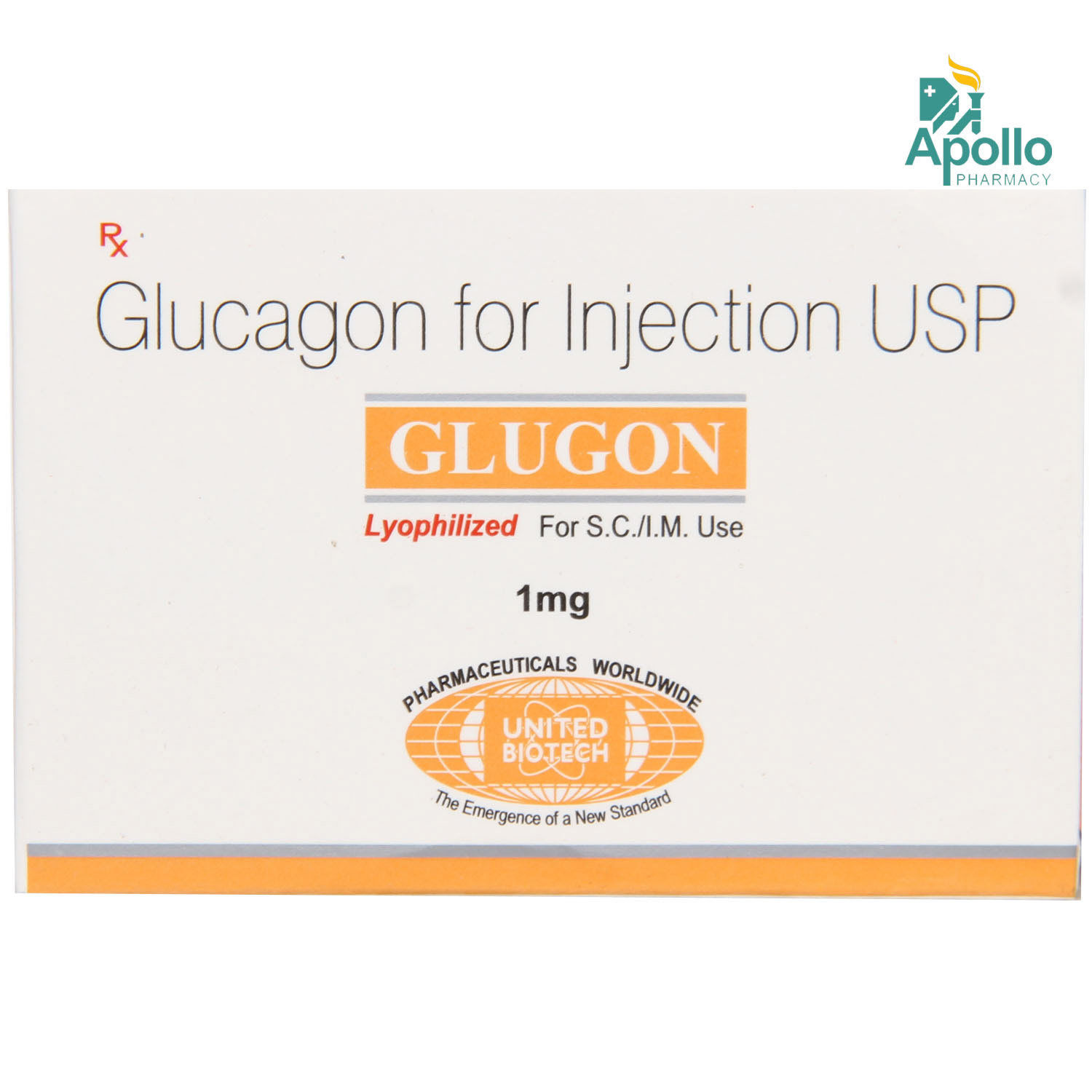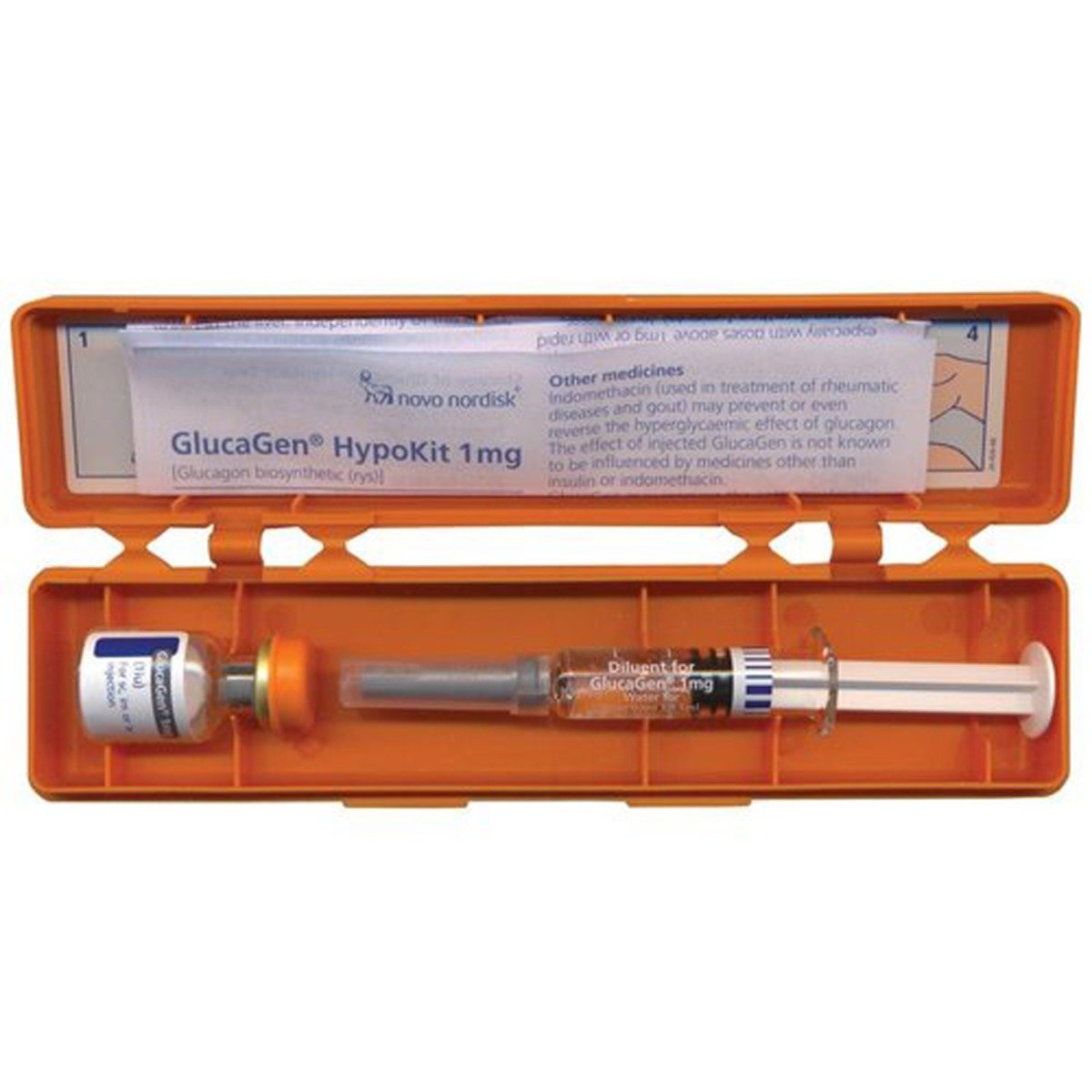Glucagon
About Glucagon
Glucagon belongs to a class of medications called hormones used to treat severe hypoglycemia (low blood sugar) in diabetic patients. Severe hypoglycemia is defined as low blood glucose levels which require assistance from another drug to treat. It is an emergency condition that requires immediate medical attention and occurs in diabetic people taking insulin and other anti-diabetic medicines.
The Glucagon contains Glucagon which works by helping the liver convert glycogen into glucose (sugar) which is then released into the bloodstream. Thus, Glucagon helps in increasing blood sugar levels.
Take Glucagon as prescribed by your doctor. You are advised to take Glucagon for as long as your doctor has prescribed it for you based on your medical condition. In some cases, you may experience vomiting, nausea, and swelling at the injection site. Most of these side effects of Glucagon do not require medical attention and gradually resolve over time. However, if the side effects persist or worsen, please consult your doctor.
If you are allergic to Glucagon or any other medicines, please tell your doctor. If you are pregnant or breastfeeding, please inform your doctor before taking Glucagon. Use Glucagon with caution in children and doses only as advised by a doctor. Avoid alcohol consumption with Glucagon as it may cause low blood sugar levels. Inform your friends and family that you are taking Glucagon and show them how to administer Glucagon so that if you become unconscious, they will be able to immediately inject Glucagon.
Uses of Glucagon
Medicinal Benefits
The Glucagon contains Glucagon which helps the liver convert glycogen into glucose (sugar) which is then released into the bloodstream. Thus, the Glucagon increases blood sugar levels. Also, Glucagon may be used to stop stomach movements during X-ray examinations to diagnose certain stomach or intestine disorders.
Directions for Use
- Follow your doctor's instructions on the dosage and timing of this medication to ensure safety.
- Glucagon will be administered by the doctor or healthcare professional.
- Do not self-administer.
Storage
Side Effects of Glucagon
- Vomiting
- Nausea
- Swelling at the injection site
- Increased heart rate
- Sweating
Medicines Containing this Salt
View AllDrug Warnings
If you are allergic to Glucagon or any other medicines, please tell your doctor. If you have low adrenaline levels, a tumor that releases insulin or glucagon, or low blood sugar caused due to excessive alcohol, inform your doctor before taking Glucagon. If you are pregnant or breastfeeding, please inform your doctor before taking Glucagon. Use Glucagon with caution in children and doses only as advised by a doctor. Avoid alcohol consumption with Glucagon as it may cause low blood sugar levels. Do not skip meals and avoid too much exercise. Inform your friends and family that you are taking Glucagon and show them how to administer Glucagon so that if you become unconscious, they will be able to immediately inject Glucagon.
Drug Interactions
Drug-Drug Interaction: Glucagon may interact with an antidiabetic drug (insulin), blood thinner (warfarin), or non-steroidal anti-inflammatory (indomethacin).
Drug-Food Interaction: Avoid alcohol consumption with Glucagon as it may cause low blood sugar levels.
Drug-Disease Interaction: If you have low adrenaline levels, a tumor that releases insulin or glucagon, or low blood sugar caused due to excessive alcohol, inform your doctor before taking Glucagon.
Drug-Drug Interactions Checker List:
Safety Advice

Alcohol
unsafeYou are recommended to avoid consumption of alcohol with Glucagon as it may cause low blood sugar levels.

Pregnancy
cautionGlucagon is a Category B pregnancy drug and is given to pregnant women only if the doctor thinks benefits outweigh risks. Please consult a doctor if you are pregnant or planning for pregnancy.

Breast Feeding
cautionIt is unknown whether Glucagon is excreted in human milk. Please consult a doctor before using Glucagon if you are breastfeeding mother.

Driving
cautionDrive only if you are alert after taking Glucagon.

Liver
cautionIf you have any concerns regarding the use of Glucagon in patients with liver problems, please consult a doctor.

Kidney
cautionIf you have any concerns regarding the use of Glucagon in patients with kidney problems, please consult a doctor.

Children
cautionGlucagon should be used in children only as advised by a doctor.
Habit Forming
Diet & Lifestyle Advise
- Eat smaller meals every 3-4 hours throughout the day.
- Do not skip regular meals.
- If a meal is delayed, have a carbohydrate form like bread.
- Include vegetables, fruits, plant foods, sources of lean protein in your diet.
- Avoid foods rich in trans fats or saturated fats.
- Limit or avoid refined and processed sugars from your diet.
- Avoid the consumption of alcohol, especially after exercise.
Special Advise
It is advised to give the patient snacks containing high sugars such as biscuits, sweets, or fruit juice as soon as they regain consciousness and can swallow to prevent low blood sugar from occurring again.
Patients Concern
Disease/Condition Glossary
Hypoglycemia: It is defined as low blood glucose levels which require assistance from another person to treat. It is an emergency condition that requires immediate medical attention and occurs in diabetic people taking insulin and other anti-diabetic medicines. The symptoms include loss of consciousness, fits, confusion or intense nightmares while asleep. The risk of severe hypoglycemia in diabetic patients increases if the regular meal is delayed or missed, insulin overdose, alcohol intake, or exercise is done without proper medication reduction.
FAQs
Glucagon is used to treat severe hypoglycemia (low blood sugar) in diabetic patients.
Glucagon contains Glucagon that helps liver to convert glycogen into glucose (sugar) which is then released into the blood stream. Thus, Glucagon increases blood sugar levels.
You are not recommended to take Glucagon with warfarin as it may increase the risk of bleeding more easily. However, please consult a doctor before using Glucagon with other medicines so that the dose may be adjusted appropriately or alternate medicine may be prescribed.
Glucagon should be used with caution in children and doses as advised by a doctor only.
You recommend avoiding taking Glucagon if you have a tumour of the adrenal gland (pheochromocytoma) or pancreas (insulinoma) and allergic to lactose or glucose.
Glucagon may cause high blood pressure and increase pulse as temporary effects. However, if it lasts for a long time or worsens, please consult a doctor.



